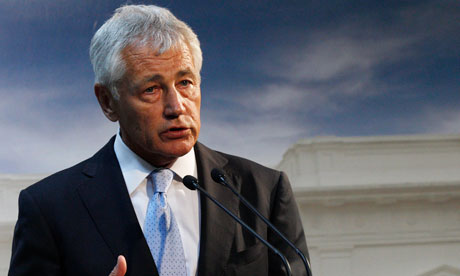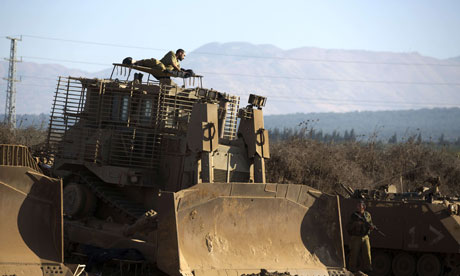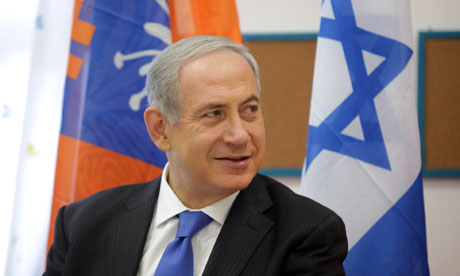
Defense secretary Chuck Hagel in Indonesia on Monday. US forces are now ready to act on any order to strike Syria, he said. Photograph: Achmad Ibrahim/AP
The United States military has provided Barack Obama with a range of options for launching an attack on Syria and is "ready to go" with an offensive, the US defence secretary has said.
There is now a growing belief in Washington that a US strike against Syria, possibly involving cruise missiles or long-range bombers, could take place in the next few days.
Chuck Hagel said military officials had presented the US president with "all options for all contingencies" and put resources in place to take action against Syria over its purported use of chemical weapons.
"We are prepared, we have moved assets in place to be able to fulfil and comply with whatever option the president wishes to take, if he wishes to take any of the options he's asked for," he told the BBC. "We are ready to go, like that."
The White House insisted on Tuesday that Barack Obama had still not made a decision about the use of military action, but stressed that "boots on the ground" was not an option being contemplated. "The options that we are considering are not about regime change," said White House spokesman Jay Carney.
He declined to say whether the US Congress would be required to authorise any military strike, or be recalled as has happened in Britain's parliament, but insisted the White House was consulting with leaders in the House and Senate and communicating with the chairmen of relevant congressional committees.
He said a US intelligence assessment of the chemical attack in a Damascus suburb would be published "this week".
In a sign that Obama believes he has the legal authority, independently of Congress, to launch a strike, Carney said that allowing the chemical weapons attack to go unanswered would be a "threat to the United States".
US defence officials recently said a destroyer armed with cruise missiles – one of four warships in the region – has been stationed in the eastern Mediterranean sea. Military transporters have also been spotted at Britain's Akrotiri airbase on Cyprus, less than 100 miles from the Syrian coast.
Reports from the region suggest the US is gearing up for a swift military action, possibly as soon as Thursday, in a punitive show of force against President Bashar al-Assad. Syria has denied its forces were responsible for a chemical attack in a suburb of Damascus, which is believed to have killed hundreds.
Jo Biden, the US vice-president, has become the most senior member of the Obama administration to blame the Syrian government for the attack.
Addressing a group of veterans in Houston, he said there was "no doubt who was responsible for this heinous use of chemical weapons in Syria: the Syrian regime".
He added that "those who use chemical weapons against defenceless men, women and children ... must be held accountable".
The Syrian opposition has been told to expect a strike against Syrian forces within days, according to a Reuters report of a meeting that took place on Monday. The meeting with the Syrian National Coalition took place in in Istanbul, and included senior western diplomats including Robert Ford, a top US official with responsibility for Syria.
"The opposition was told in clear terms that action to deter further use of chemical weapons by the Assad regime could come as early as in the next few days, and that they should still prepare for peace talks at Geneva," a source at the meeting told the news agency.
The chairman of the Joints Chief of Staff of the US military, General Martin Dempsey, told Congress last month that even "limited standoff strikes" against Syria would require hundreds of aircraft, ships and submarines and could cost billions of dollars.
While such action would "degrade regime capabilities" and lead to defections, Dempsey told the House Foreign Affairs committee, there was a risk of retaliatory attacks and "collateral damage impacting civilians". He also warned of "unintended consequences" of any military intervention in the complex civil war.
In Britain, there were strong signs military action could be imminent, after the prime minister David Cameron announced parliament would be recalled to vote on a motion about the country's "response to chemical weapons attacks in Syria" on Thursday.
The US would be expected to have laid out preliminary plans for any military attack, or at least expressed a clearer intent over the use of force, before any foreign government voted on on whether to support such action.
World leaders have issued a string of bellicose statements in the last 24 hours, with Iran and Russia standing alongside the Assad regime against an emerging western alliance led by the US, UK, France and Australia. Iran's foreign ministry spokesman, Abbas Araqchi, intimated that Tehran would respond, should the west strike.
US secretary of state John Kerry said on Monday that Syria had committed a "moral obscenity" and Obama was preparing a co-ordinated with response with international allies. "Make no mistake," Kerry said. "President Obama believes there must be accountability for those who would use the world's most heinous weapon against the world's most vulnerable people."
The White House, which has long been reluctant to become militarily involved in the Syrian conflict, appears to have shifted its position over the weekend, after a top intelligence officials presented evidence of the chemical attack, arguing it could only have been administered by Syrian forces.
The administration is preparing to release parts of its intelligence assessment in the coming days, as it attempts to build congressional and public support for tough action against Syria. "I think the intelligence will conclude that it wasn't the rebels who used it, and there'll probably be pretty good intelligence to show is that the Syria government was responsible," Hagel said. "But we'll wait and determine what the facts and the intelligence bear out."
He added: "In our opinion, I think the opinion of the entire world community, Syria used chemical weapons against its own people.
"I think most of our allies, most of our partners, most of the international community that we've talked to – and we have reached out and talked to many – have little doubt that the most base international humanitarian standard was violated in using chemical weapons against their own people."
Hagel's comments about Syria's "violation" of an international human rights standard echoed the language used by the State Department and White House. It suggests the US will attempt to mount a legal justification for any strikes, outside a UN framework, by arguing Assad's forces were responsible for a breach of humanitarian law.
Strong opposition from from Russia and China means it is highly unlikely the US will receive support for military action from the UN security council.
Although the US stresses the administration is seeking a broad coalition of partners for any action, the UN is being increasingly sidelined. Carney said on Tuesday the work of weapons inspectors now was Damascus was "redundant" because it has already been established that chemical weapons were used by Syria on a large scale.
In a further blow to the inspections process, the UN said on Tuesday that its inspectors had postponed their visit to one of the affected sites for 24 hours amid concerns for their security.
An sniper attack on the UN team on Monday led to substantial delays.
"Following yesterday's attack on the UN convoy, a comprehensive assessment determined that the visit should be postponed by one day in order to improve preparedness and safety for the team," the UN said in a statement.
Israeli intelligence 'intercepted Syrian regime talk about chemical attack'
Information passed to US by Israeli Defence Forces's 8200 unit, former official tells magazine

An Israeli soldier rests on his armoured bulldozer in a deployment training area in the Golan Heights near the border with Syria. Photograph: Menahem Kahana/AFP/Getty
A team of United Nations inspectors have resumed their second day of investigations at the site of an alleged chemical weapons attack outside Damascus, as western leaders moved towards military action in response to the Syrian regime's reported use of chemical weapons against civilians.
The UN team left their Damascus hotel early on Wednesday after the operation was suspended on Tuesday following a sniper attack on its convoy on Monday.
The bulk of evidence proving the Assad regime's deployment of chemical weapons – which would provide legal grounds essential to justify any western military action – has been provided by Israeli military intelligence, the German magazine Focus has reported.
 Binyamin Netanyahu said Israel was 'prepared for every scenario'. Photograph: Yossi Aloni/AFP/Getty Images
Binyamin Netanyahu said Israel was 'prepared for every scenario'. Photograph: Yossi Aloni/AFP/Getty ImagesThe 8200 unit of the Israeli Defence Forces, which specialises in electronic surveillance, intercepted a conversation between Syrian officials regarding the use of chemical weapons, an unnamed former Mossad official told Focus. The content of the conversation was relayed to the US, the ex-official said.
The 8200 unit collects and analyses electronic data, including wiretapped telephone calls and emails. It is the largest unit in the IDF.
Israel has invested in intelligence assets in Syria for decades, according to a senior government official. "We have an historic intelligence effort in the field, for obvious reasons," he said.
Israel and the US had a "close and co-operative relationship in the intelligence field", he added, but declined to comment specifically on the Focus report.
Senior Israeli security officials arrived in Washington on Monday to share the latest results of intelligence-gathering, and to review the Syrian crisis with national security adviser Susan Rice.
In northern Israel, a military training exercise began on Wednesday in the Golan Heights, Syrian territory that has been occupied by Israel since 1967. There have been numerous incidences of mortar shells and gunfire landing on the Israeli-controlled Golan over the past year, prompting return fire by the IDF on occasion.
The Israeli prime minister, Binyamin Netanyahu, was due to convene the security cabinet on Wednesday to discuss impending US military intervention in Syria. Officials are assessing the chances of Syrian retaliation against Israel following US action.
An unnamed senior Syrian army officer told the Iranian news agency Fars: "If Syria is attacked, Israel will also be set on fire and such an attack will, in turn, engage Syria's neighbours."
Israel was "prepared for every scenario" and would respond forcefully if necessary, Netanyahu said after the meeting.
Later, Benny Gantz, the Israeli chief of staff, said: "Those who wish to harm us will find us sharper and firmer than ever. Our enemies should know that we are determined and ready to defend our citizens by any action necessary, against any threat and in any scenario we will face."
The likelihood of Syrian retaliation depended on the scale of the US attack, said military analyst Alex Fishman.
"If it is decided to fire several dozen Tomahawk missiles at military targets, there is a chance that the Syrians will succeed in containing the attack, presenting the offensive as a failure and praising the staying power of the army and the Syrian people; however, if it is decided to fire hundreds of missiles and significantly harm its strategic assets, the Syrian need for an act of revenge will heighten," Fishman wrote in Yedioth Ahronoth.
"The formula is simple: The more threatened the Syrian regime feels, the greater the chance that it will fire at its neighbours," he added.
Meanwhile, demand for gas masks and protection kits from the Israeli public continued to rise. The Israeli postal authority said telephone inquiries had increased by 300% and queues had formed outside distribution depots.
According to a report in Ma'ariv, Israel's home front command is grappling with the problem of providing gas masks to men with beards, extremely common among ultra-Orthodox Jews. A special mask, which can accommodate a beard, is available but the high cost means it is only distributed to men over 65 or whose beards are for health reasons.
"Men who grow beards for religious reasons will have to shave in the event of a chemical attack," Ma'ariv reported.

